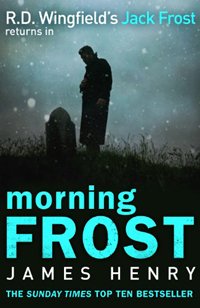This is the third in a series of prequels featuring a younger William ‘Jack’ Frost. The author of the original Frost series, RD Wingfield, died in 2007 but in 2011 James Henry (a pseudonym for James Gurbutt and Henry Sutton) wrote First Frost and followed it in 2012 with Fatal Frost
.
Inevitably, we are tempted to address the question of rewrites/pastiches of famous characters. Someone always seems to be writing a new Sherlock Holmes story, and both Philip Marlowe and James Bond are regularly recreated. Does this matter? Is it a case of journeyman writers tapping into a cash flow, or are authors satisfying a demand from admirers of those no longer able to write new stories? That’s a debate is for another day. What matters is this book, and whether it works as a standalone novel.
The first thing to to clear from your mind is any visual reference to the television series. Forget David Jason and Bruce Alexander. Forget the wheezy veteran detective. Bear in mind that Wingfield said of Jason’s portrayal, “He just isn’t my Frost.”
Henry’s Frost is not yet 40, and sprightly enough to be having an affair with a young female colleague. Also, remember that this is 1982. It’s set in an England where Rumbelows is still selling electrical goods on the high street, the iconic Ford Cortina is been replaced with the smoothly contoured Sierra, a desktop computer is the size of small refrigerator, CB radio is all the rage with lorry drivers, and police stations up and down the land are full of the smoke from ten thousand Senior Service and Rothmans King Size cigarettes. This is every bit as much a period crime novel as anything by John Lawton or Philip Kerr.
In the drab town of Denton (probably in the South Midlands of England) the idiosyncratic policeman, DS Jack Frost, is having a bad week. Leaving aside the fact that a young teacher has been raped in the staff toilets at her school, various body parts have been ploughed up in a local farmer’s field, and a minor villain is having a bullet removed from his shoulder, there remains the small matter of the funeral. Of Jack’s wife. She has succumbed to an aggressive cancer. Just hours after Mary’s coffin is lowered into the ground Jack, alternately bored and humiliated at the wake, manages to head-butt his obnoxious brother-in-law, thus causing much spillage of dry sherry.
Using the day job to mask his grief (and guilt), Jack tries to solve the shooting and a subsequent payroll robbery. He also has a busy personal agenda. He must deal with the fact that he may be the father of an unborn child, must keep his jobsworth of a boss at arms length while quietly ignoring the fact that outside of ‘the job’ he has no life. He has failed his late wife, he is a domestic disaster, has a potentially fatal cigarette habit, and is only marginally aware of the many stresses and pressure points faced by his colleagues. Regarding the shooting, Frost and his team realise that they are pitting their wits against a very thorough and ruthless female criminal, but there is another more sadistic figure in the shadows, whose identity the author cleverly conceals until the closing stages of the book.
Though third in a series, this book works superbly as a stand-alone novel. The period setting is authentic, the plot threads are brought together with convincing ease and there is a certain amount of grim reality sprinkled with sardonic humour. I read this book through in a single sitting.
Bantam Press
Print/Kindle
£7.19
CFL Rating: 5 Stars










